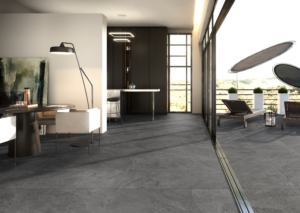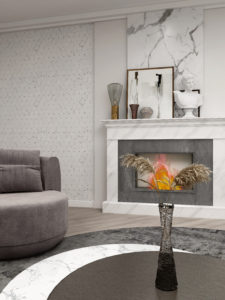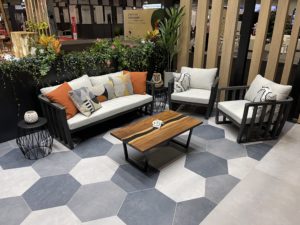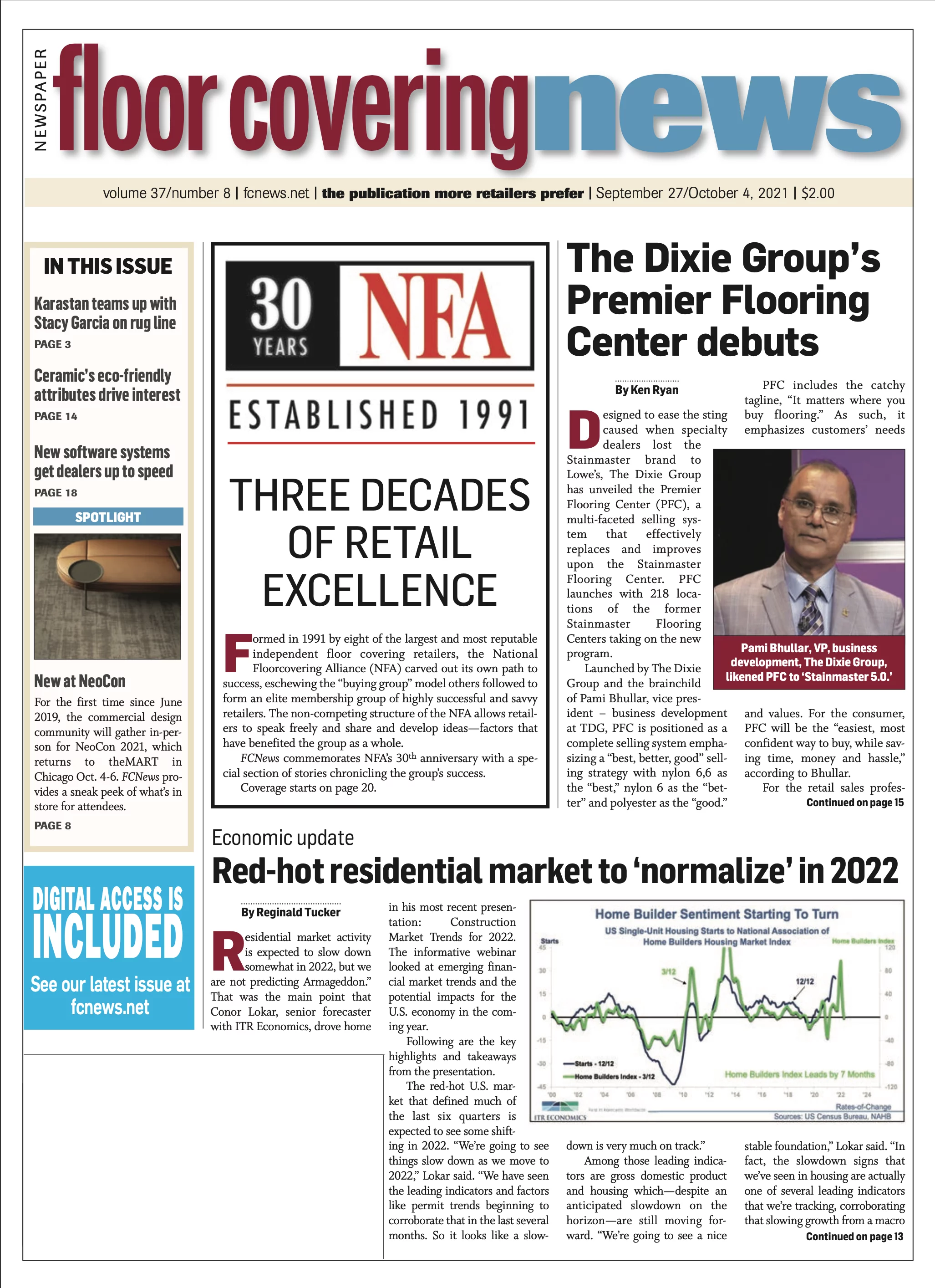By Megan Salzano—While resilient flooring— rigid core SPC in particular—has taken the industry by storm, ceramic tile is poised for a resurgence. Not only is the category one of the most design-forward and technologically advanced options on the market, proponents say, but its eco-friendly attributes are a growing draw for consumers.

Millennials, who command more than $1 trillion in spending power, and Gen Z, who make up 40% of all consumers in the U.S. and influence nearly $4 billion in spending, have put sustainability front and center whenever possible when it comes to their purchasing preferences. Flooring is no exception. And while that preference has raged for some time now, the global pandemic only spurred it on more robustly.
“The pandemic has accelerated environmental awareness, sustainable consumption and social responsibility among many consumers,” Suzanne Zurfluh, director of design and trends, Emser Tile, told FCNews. “Social isolation brought about from the quarantine has helped many become more committed to changing their own behavior
to advance sustainability efforts. As individuals have become more connected to the outdoors with biophilic design, they are recognizing the overall importance of nature as well as the benefits of bringing these elements into a space. This behavior is encouraging more individuals to move toward a healthier and more sustainable lifestyle.”

From ceramic’s manufacturing process to its longevity, tile easily stands out from the crowd when it comes to eco-friendly attributes and focused sustainability. “Tile is one of the key eco-building materials that is rich in history for a good reason,” explained Suzi Portugal, vice president of design and sourcing, Anthology. “This durable material is one that can outlive the human lifespan. It is hugely important for the environment and building materials ecosystem. Ceramic tile is formaldehyde, PVC and VOC free—as well as hypoallergenic—and has one of the most sanitary of surfaces.”
Sam Kim, senior vice president, MSI, agreed, noting, “Tiles’ eco-friendly nature has grown commensurately with the consumers’ and commercial operators’ interest in eco-friendly products over the years. Tiles are engineered to last the lifetime of the building, with virtually no maintenance required. The longevity aspect of tiles is what makes tile exceptionally eco-friendly.”

In addition to its longevity, tile’s manufacturing process and makeup also prove valuable when looking for sustainable flooring materials. “Created with elements of clay, water and fire, tile is as fundamentally natural now as it has been over its history that spans thousands of years of use,” said Lindsey Waldrep, vice president, marketing, Crossville. “The eco-friendly advantages of tile are innate, but Crossville takes it even further with a foundational corporate commitment to sustainability and green manufacturing processes.”
Florida Tile, too, favors an eco-friendly manufacturing process. “Many factories, including Florida Tile, now have closed-loop processes that reuse water and heat created from the natural gas kilns,” said Micah Hand, director of marketing and product management. “This gives tile a very low carbon footprint. The final product creates a healthy and sustainable environment that is free from allergens, VOCs, formaldehyde and PVC.”

Changing preferences
It’s obvious that with their massive spending power, millennials and Gen Z are key demographics to entice in today’s flooring market. Add to that the current boom in home purchases and renovations and the industry has an unprecedented opportunity to sell flooring—and tile in particular as it taps one of these cohorts’ biggest purchasing preferences.
“They have grown up with everything available, but they also saw the recent changes in weather and the great impact that it is having on our lives and on the planet,” explained Paolo Mularoni, president, Del Conca USA. “Many of them took it on as a cause to solve, also through ‘responsible purchasing.’”
Suppliers agree, tile’s inherent eco-friendly attributes can be used, in part, to draw these two demographics back to the category. “I do believe the eco-friendly nature of tile can help to attract younger generations like the millennials and Gen Z to this category, especially since they are extremely focused on their environmental footprint, as well as purchasing from sustainable brands that are authentic,” Emser’s Zurfluh explained. “As the sustainability story of tile continues to be promoted and elevated by manufacturers and retailers alike, more attention will be brought to this category.”
Whitney Welch, vice president of commercial sales, DalTile Corp., agreed: “Study after study has shown that for both millennials and Gen Z, eco-friendliness and sustainability are critical attributes. Various studies show that not only are they willing to pay more for a sustainable option, but that many times it is a non-negotiable requirement. While other products are racing to meet rising consumer demand for sustainable or environmentally friendly products, tile is already green—we just need to make sure that we communicate that effectively to millennials and Gen Zers.”
Crossville’s Waldrep said manufacturers must be attuned to the perspectives and priorities of millennials and Gen Zers to answer the eco-driven standards of these influential generations.
“These cohorts are not swayed by platitudes and ‘green speak;’ they’re savvy to identify when practices match what’s preached by brands and will make purchasing decisions accordingly.”
New products in tile
For Daltile, the current hot trend of well-being incorporates many of the principles of sustainability through biophilic design. Daltile’s new Perpetuo marble-effect porcelain floor and wall tiles are designed to transform bathrooms and bedrooms into spaces dedicated to wellness.
L’Amour, Emser’s newly introduced mosaic tile collection, pairs the look of natural marble with an eco-conscious, recycled glass construction. Its recycled glass construction aims to provide the elegance and sophistication of natural marble while allowing for easy care and maintenance along with better affordability.
Some of MSI’s latest tile collections are expanding tile’s eco-friendly attributes from the indoors to the outdoors, with its latest indoor tile and outdoor paver collections, which include Concerto collection (concrete-inspired); Legions collection (modern, high-end stone looks) and Caldera collection (sun-washed wood looks).
Crossville’s Shades 2.0 is responsibly and sustainably manufactured in Crossville, Tenn., and is on the cusp of earning Petal certification through the International Living Future Institute.
Florida Tile’s East Village HDP is a porcelain floor and wall tile that checks all the boxes. It is made in the USA in the company’s Green Squared-certified advanced manufacturing center in Lawrenceburg, Ky., and consists of 40% pre-consumer, recycled content.

